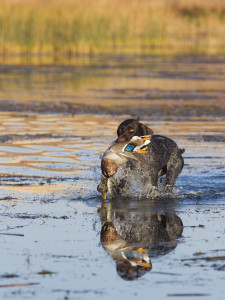 A common mistake for new hunters is not having their dog prepared for the season. They pay a small fortune for a well-bred retriever only to face disappointment when they finally get the dog out in the field. Just like us, the dogs need to be trained in real hunting conditions if you expect them to perform well during an actual hunt. Remember, this is not playing fetch in the backyard, but far from ideal conditions in some pretty nasty weather at times. If you are duck hunting Missouri grounds this year, start getting your dog ready before the season starts.
A common mistake for new hunters is not having their dog prepared for the season. They pay a small fortune for a well-bred retriever only to face disappointment when they finally get the dog out in the field. Just like us, the dogs need to be trained in real hunting conditions if you expect them to perform well during an actual hunt. Remember, this is not playing fetch in the backyard, but far from ideal conditions in some pretty nasty weather at times. If you are duck hunting Missouri grounds this year, start getting your dog ready before the season starts.
Decoys are Not Real Ducks
A new and unprepared dog is often just as likely to go after a decoy as a real duck during retrieval. You can fix this by setting up a decoy spread and walking your dog through the spread. If the dog goes after one of the decoys, you need to make him understand that decoys are not to be touched. Once the dog can perform that task, you can start using a training decoy or a frozen bird from last season (think ahead and freeze a dozen or so ducks to be used as training ducks at the end of the season to give your dog a taste of the real thing during training).
Use Real Hunting Conditions
Whether using a blind or a boat, you want to make sure your dog is used to this atmosphere. If you have an area around you, set up exactly as you would during a hunt and have the dog practice his retrieves with a dummy in real conditions. Your dog will learn to behave in the blind or if you are hunting out of a boat, how to properly get in and out of the boat during a retrieve.
You also need to practice shooting with the dog. Even experienced dogs can get spooked the first time they hear the sound of gunfire going off over their head, so imagine what it will do to a new pup. Introduce the dog to the shooting gradually, with shooting directly over the dog’s head at the end of the training. By the time you are on a real hunting trip, the gunfire is just another part of the day for your dog.
Something else that you must expose your dog to is calling. The dog will naturally get excited the first time it hears a call. But, the dog needs to be able to distinguish your calls from the real thing. The dog must be able to remain calm why you or someone else is calling to lure the ducks in closer. If the dog goes crazy, you can all but guarantee the day will be a total loss and you will have a lot of explaining to do to the rest of your group.
Dogs are just like us, they need a little bit of training to get back into mid season form. While new dogs obviously need a lot more training, even experienced dogs will benefit from a small offseason training session. The more training you do, the better success you will have once it is time to get out there for real.






